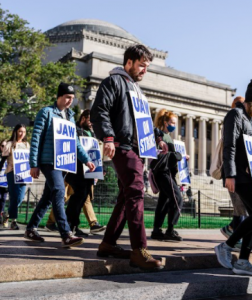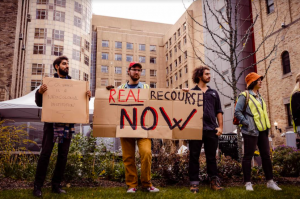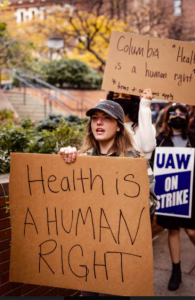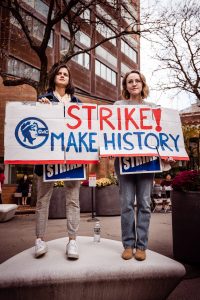By Noah Smith, RightsViews Co-Editor and a graduate student in the human rights MA program.
The opinions expressed in this article are Noah’s own and are not representative of the Institute for the Study of Human Rights (ISHR) or Columbia University.
As of November 3, 2021, the Student Workers (SWC-UAW Local 2110) of Columbia University went on an indefinite strike, prolonged by the unwillingness of Columbia University’s administration to offer a fair contract to student workers. With the end of the John Deere strike earlier this week, the Columbia student workers strike is now the largest strike action in the country. The SWC-UAW Local 2110 has been legally recognized by the National Labor Relations Board (NLRB) since 2017, and there are over 3,000 members in the unit, making it one of the largest student worker unions in the country.
Columbia’s student workers are demanding a fair contract that includes a living wage, better healthcare, union recognition for all student workers, and protections from se xual harassment and power-based bullying. These are not abstract ideals: they are fundamental human rights. Currently, the University pays graduate student workers $6,000-$19,000 below a living wage according to the MIT cost-of-living calculator for New York City, depending on the program. Some graduate student workers have had to sign up for SNAP benefits (sometimes called “food stamps”) to survive, particularly if they have caretaking responsibilities, such as raising children.
xual harassment and power-based bullying. These are not abstract ideals: they are fundamental human rights. Currently, the University pays graduate student workers $6,000-$19,000 below a living wage according to the MIT cost-of-living calculator for New York City, depending on the program. Some graduate student workers have had to sign up for SNAP benefits (sometimes called “food stamps”) to survive, particularly if they have caretaking responsibilities, such as raising children.
Some teaching assistants, research assistants and instructors have had to move to entirely different cities to offset the cost of rent. Worse still, the University added to the urgency of a strike by unilaterally changing students’ compensation system during summer 2021, resulting in an $8,000 shortfall for many student workers. This illegal pay change requires affected student workers to go into debt within a month of class beginning, according to Columbia’s own cost-of-living calculations. The SWC filed an unfair labor practice charge with the NLRB over Columbia’s changed disbursement policies, calling it “illegal to discontinue an established benefit during contract negotiations.”
During the Spring 2021 strike, RightsViews interviewed Mandi Spishak-Thomas, a Ph.D. Candidate in Social Work regarding the strike. Mandi is now a member of the SWC-UAWs ten-person bargaining committee, and spoke with Co-Editor of RightsViews Noah Smith, regarding the current strike.
Since we last spoke, what has Columbia University done to meet the Student Workers (SWC-UAW Local 2110) of Columbia demands?
The university has made very little movement on our demands. We have been back at the bargaining table for the past several months and we’ve yet to receive anything substantial from the university at this point. In recent negotiations they have shown marginal willingness to move on the issue of neutral arbitration, specifically third-party arbitrations, in cases of discrimination, sexual harassment, work place bullying etc., and transitional funding. So, for individuals experiencing an abusive advisor, we are asking that the university financially support these students through having access to transitional funding as they change advisors. During bargaining, university representatives have shown their willingness to potentially concede on these issues. But we have yet to hear from them on anything related to recognition of our student union, health benefits, and a living wage. All of which are hugely important articles to our movement.
access to transitional funding as they change advisors. During bargaining, university representatives have shown their willingness to potentially concede on these issues. But we have yet to hear from them on anything related to recognition of our student union, health benefits, and a living wage. All of which are hugely important articles to our movement.
What reasoning has Columbia University used to justify denying you a fair contract?
The university’s bargaining committee has actually agreed that the price is not part of the equation, saying that they can afford to pay us a living wage and offer affordable healthcare, but they simply choose not to because they don’t want to. We both know Columbia University’s endowment grew by roughly three billion dollars ($14.35 billion total endowment) during the Covid-19 pandemic and university President Lee Bollinger makes roughly 4.5 million dollars a year. He is one of the highest paid university presidents in the country. As I said it’s not a matter of price, they agree that they can afford our demands, so their only excuse at this point is that our demands are unreasonable. They said, in our last bargaining session, that if they gave us a living wage, god forbid, they would have to give all Columbia University workers a living wage and affordable healthcare. These are the things we are hearing from them at the bargaining committee, which is absolutely absurd because every single worker at Columbia University deserves to make a living wage, have worker protections, healthcare and feel safe in the workplace.
Have you, or any individuals you know, suffered retaliation for participating in the Spring 2021 strike?
Personally, I have not, and I don’t know of anyone in the School of Social Work experiencing retaliation for participating in the Spring 2021 strike. But I can tell you that we’ve received several reports from students’ workers during the current strike (Fall 2021), of retaliation, and just a reminder it is illegal in the United States to be fired while on strike or being threatened with termination for participating in a strike. These are a few things we’ve actually heard are happening in a handful of cases during this strike. We are also investigating whether Columbia University is potentially docking our statuses from being department researchers or teaching assistants, to simply students. We’re also hearing from people that they are unable to access their normal print quotas, which sounds really miniscule, but it’s the way we all function. All of this behavior from the university just underscores their unwillingness to recognize that we are workers, not just students. As we discussed last semester, the university does not consider us employees and that is how they justify not paying us a living wage, not giving us workplace protections, and not giving us neutral third-party arbitrations in cases of harassment, discrimination, and assault in the workplace. Columbia University’s action directly ignores the National Labor Relations Board decision that we are workers, not just students, and we deserve the demands we are making. Just so you know, we are in contact with the UAW legal team, and we have filed unfair labor practices through the National Labor Relations Board (NLRB) with which we have already filed unfair labor practice complaints due to various violations within the past few months.
As students of Human Rights, we have been horrified by Columbia University’s treatment of its graduate students and workers. Many of us, myself included, are finding it difficult to study human rights from a university that is actively suppressing the human rights of its student workers. What do you have to say to us studying human rights?
I would say that Columbia University is a microcosm of the greater social injustices currently happening in our country. I also think Covid-19 has put a huge magnifying glass over all the disparities in our country, namely health disparities and racial disparities. So, I would say that this is your fight too. If we want to change the corporatization of academia, we need to start by paying student workers a living wage and providing protections against workplace discrimination and harassment, and access affordable healthcare. I think this is true across all industries, we’re seeing a huge labor movement happening right now, we’re seeing workers demand what they are entitled to, workers are tired of being treated like trash. For people studying human rights, just know that this strike is absolutely a human rights issue, and this is something we are seeing outside of Columbia too. Columbia University is just a single actor within this sort of white supremacist and capitalist society we see in the United States, and the world moreover.
The SWC-UAW strike has disrupted many core classes, some of which are postponed indefinitely. Many undergraduates are stuck between learning loss and solidarity with strikers, what would you like to say to them?
I would say that not every teachable moment happens in the classroom. I think this is a really important issue that impacts undergrads, and it impacts grad students that are not currently workers. Because if we are able to make this university a better place by supporting student workers, then we’re also going to have a huge ripple effect in academia. We will see more diversity in academia, because we’re going to see people from all backgrounds and all walks of life, be able to afford a PhD here, because they would be making a living, in one of the most expensive cities in the country. In turn, this will change the way we do research. We have lots of academics who are white and come from upper middle-class backgrounds who are doing research on low income, primarily people of color communities. Instead, this research could and should be led by the people who are directly impacted by this research and the policies it inevitably influences. So, I study Medicaid policy, for example, and just think how rich and amazing our research could be if it was being conducted by people who directly experience barriers to accessing healthcare. This would be the same across all fields of study. So, to the students missing class, I think if we zoom out of this moment and think of the bigger picture, we can learn so much from this labor movement, this human rights movement, all of which could not be replicated in the classroom. This is a moment of reckoning. 
I actively covered the Spring 2021 strike, and this current strike appears more urgent, desperate even. How do you respond to this observation?
That’s interesting wording. I would say that you’re seeing years of being treated with constant disrespect and the constant inability of the university to acknowledge that students are workers, we are the whole reason that the university functions. So, I would say that we were definitely pissed off and tired. I would also say that there are three factors that differentiate our current strike from the Spring 2021 strike. Namely, I think right now we have situated our movement within the broader labor movement sweeping across our country right now, which we did not have going for us in the Spring. For example, John Deer just voted on their contract, and before they settled, they were the biggest strike in the country, and now we are the biggest strike in the US right now. Overall, this is an amazing time to be striking, because we see so much solidarity across the country and in academia too, NYU just got their contract at the end of the Spring 2021 term.
Secondly, we have an extremely unified bargaining committee. We just ran on a slate of ten of us, and we ran as people who are a part of the rank-and-file system. We also ran on a more transparent and democratic caucus, so we were able to make more strategic moves because we have a huge unit of support behind us at the table. Thirdly, and most importantly, we’ve had a huge undergraduate support and master support as well from people who are not technically in our unit. Undergraduates have been showing up for us since day one, since before the walk-out, and having students back on campus has also been very influential to our work. Their presence has been really energizing for us and has been absolutely critical to our success so far.
I reached out to Columbia University President Lee Bollinger on multiple occasions for comment regarding the strike and was denied an interview or comment. If you would like to support the Student Workers of Columbia – UAW please review their website to learn about their demands and follow their socials (twitter, instagram, and facebook) to keep informed about their work. For strikers sign up for picket shifts here and sign up for UAW strike benefits here, and read the strike FAQs here. If you would like to help feed and support striking student workers check out their Hardship Fund for Columbia Student Workers
Photos
Photos courtesy of Jeremy Chiu | @jeremychiuu

